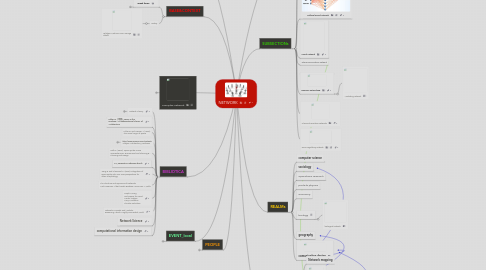NETWORK
создатель gözde kartoglu


1. Complex network
1.1. New node
2. BASE&CONTEXT
2.1. Graph theory
2.1.1. Sub Idea 2
2.2. History
2.2.1. Teletype Machine,1940, George Stibitz
3. BIBLIOTICA
3.1. Netwrok Theory
3.1.1. Session Rule 1
3.1.2. Session Rule 2
3.2. Hillier B. (1999), Space is the Machine: A Configurational Theory of Architecture
3.3. Hillier B. and Hanson J. (1984), The Social Logic of Space
3.4. http://www.amazon.com/Network Analysis Architecture_Kaufmann
3.4.1. Goal 1
3.4.2. Goal 2
3.5. Ratti C. (2004). Space syntax: some inconsistencies. Environment and Planning B - Planning and Design
3.6. AA_Parametric urbanism briefs
3.7. Jiang B. and Claramunt C. (2002), Integration of space syntax into GIS: new perspectives for urban morphology
3.8. The Structure and Dynamics of Networks Mark Newman, Albert-László Barabási, & Duncan J. Watts
3.9. Graph Mining Techniques for Social Media Analysis Mary McGlohon Christos Faloutsos
3.10. Networks, Crowds, and Markets: Reasoning About a Highly Connected World
3.11. Network Science
3.12. computational information design
4. PEOPLE
4.1. Burak Arıkan
4.2. Nilüfer Kozikoğlu
5. New node
6. EVENT_local
6.1. Ağ Modelleri Buluşması
7. Electrical network
8. SUBSECTIONs
8.1. Computer network
8.1.1. LAN (local area network)
8.2. Biological network
8.3. Artificial neural network
8.4. Social network
8.5. Telecommunications network
8.6. Business networking
8.6.1. Marketing network
8.7. Chemical Reaction Networks
8.8. Gene regulatory network
9. REALMs
9.1. computer science
9.2. sociology
9.3. operations research
9.4. particle physics
9.5. economy
9.6. biology
9.6.1. biological network
9.7. geography
9.8. comunicaiton design
10. new CONTEXT
10.1. Network mapping
10.2. Cartography
10.3. Network architecture
10.4. urban: Parametric Urbanism_Information Urbanism
10.4.1. space syntax
10.4.2. daily life patterns
10.4.3. Information processing
10.4.4. swarm urbanism
10.5. Information Visualization
10.5.1. computational information design
